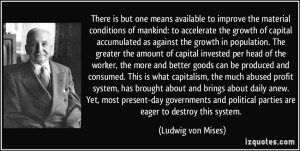submitted by jwithrow.
Failure is just as much a facet of free market capitalism as success is.
In a free market economy, well managed businesses with desired products and services will succeed and poorly managed business with undesired products and services will fail.
Consumers, when well informed, will make decisions based on their individual preferences; they will either buy the highest quality product at the lowest price for which that product is available or they will buy a lower quality product for a price lower than the higher quality product. Consumers are typically not very interested in paying high quality prices for low quality products.
So, in the free market, businesses must constantly strive to either offer the best product at the lowest price or a suitable product at a very low price. This requires businesses to focus on improving efficiency and decreasing costs without sacrificing product quality. If a business cannot offer competitive products at competitive prices then it will not be in business for very long.
This model aligns the interests of both businesses and consumers and creates a self-regulating incentive structure.
In the free market system, businesses have an incentive to offer quality products to customers at the best price and they have a disincentive to offer poor products at poor prices. While this is a simple representation, the incentive structure is one of the core principals underlying the free market system.
But what happens if businesses are not allowed to fail due to government intervention?
We have seen numerous cases of this scenario in recent years. The “too big to fail” banks were propped up by the federal government when they came to the point of failure. Fannie Mae and Freddie Mac were taken under receivership by the federal government when they came to the point of failure. General Motors was temporarily taken over and propped up by the federal government when it came to the point of failure.
This is moral hazard.
Oh, and we should probably mention that the federal government cannot actually bail anything out with its own capital. To fund the bail-outs, the government has to appropriate capital from the private sector in the form of tax dollars and it has to borrow money from the Federal Reserve that was created out of thin air.
So the business losses were socialized but the profits remained privatized – this is fascism in action.
By creating moral hazard in this way, the disincentive piece has been removed from the system and the incentive model has shifted away from a consumer focus and to a focus on generating high profits with no regard for risk. Such a model is a win-win for the favored businesses and the government cronies that they support. The losers are everyone else as the economy turns to mush.
Coming full circle, failure is a welcome facet of free market capitalism. Maybe not for the companies’ doing the failing, but failure is a force for creative destruction that serves to weed out the businesses that cannot offer quality products at reasonable prices.
This is why it is ridiculous to claim that any company is “too big to fail” as justification for bail-outs. Sure there would be temporary hardship were the major banks to fail, but this would eventually free up capital and clear the way for sustainable banking practices to be implemented.
